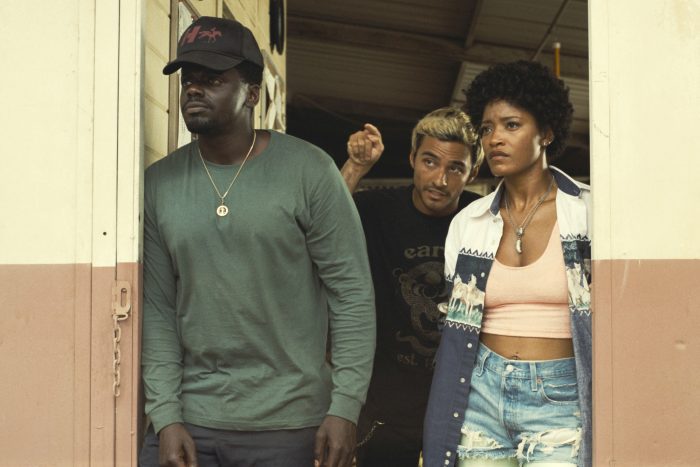Reviewed by Jeffrey Sanzel
If something tries to be too many things, does it risk becoming about nothing?
Such is the case with writer-director-producer Jordan Peele’s Nope, a science fiction-horror-Western-comedy-domestic family drama that comments on everything from race to commerce to capitalism. The brilliant Peele’s previous work included Get Out and Us, highly original and disturbing films that combine his unique visuals with compelling storytelling.
On the surface, Nope is a traditional summer blockbuster, a high-end It Came From Outer Space, or a darker, violent Close Encounters of the Third Kind.
With nods to matinee features of the past, the setup trades on well-known tropes with an intentionally old-fashioned feel: Something not right is going on out in the dessert … power ceases, winds blow, horses whinny … could it be that strange object glimpsed in the sky?
Nope centers on the Haywood family, owner of Haywood’s Hollywood Horses. After the sudden and mysterious death of Otis, Sr., his son, Otis, Jr., takes over the business. (A fascinating Daniel Kaluuya is first-rate: His deadpan, comedic timing is flawless, and his dramatic stillness shows brooding depth.) Otis, Jr.—called O.J. (the first of many odd and unrelated commentaries)—struggles to keep the business going.
His sister, Emerald (a force of nature in the hands of Keke Palmer), interferes, goads, and offers her opinions, hopes, and visions. She is both a support and a thorn, often simultaneously. In the hands of these gifted actors, the sibling relationship deserves an unencumbered film of its own.
Quickly, the dessert residents become aware of a UAP—Unexplained Aerial Phenomena (what used to be called a UFO). Former child star Ricky “Jupe” Park (Steven Yeun) runs a third-rate western attraction, Jupiter’s Claim, and introduces the Star Lasso Experience, whereby his audience can see the UAP. With shades of King Kong and the like, this does not go well.
Meanwhile, O.J. and Emerald enlist a Fry’s Electronics employee, Angel Torres (wryly understated Brandon Perea), to help them film the entity. Eventually, they recruit cinematographer Antlers Holst (a delightfully mannered and just over the edge of bizarre Michael Wincott) to help them capture the phenomenon on film. Earlier, Holst had fired O.J. from a commercial shoot when one of the Haywood horses kicked a crew person. (The importance of why surfaces later.)
All this is standard horror movie fare. Peele adds flashbacks of Park’s childhood incident on a sitcom, Gordy’s Home!, where the titular chimp went on a rampage, mauling and possibly murdering cast members. The link to the present is tenuous. Perhaps it is about predators. Maybe it is about exploitation. Or capitalism. Maybe. O.J. says of the extra-terrestrial: “It’s alive, it’s territorial, and it wants to eat us.” Are we meant to draw a connection?
Or is it that Park was on television? So much of Nope focuses on media and capturing the worst events with the goal of fame and profit? Emerald and O.J.’s reflexive discussion of the “money shot”—the “Oprah shot”—drives them forward. How much relates to the Haywood patriarch’s claim that the unnamed man in the first moving picture, The Horse in Motion, was his great-great-grandfather? Is this a commentary on both racial and historical cinematic issues?
And then those inflatable men? Are they meant as symbols? Or, to bastardize a Freudian quote: “Sometimes an inflatable man is just an inflatable man.” (Oh, and the TMZ reporter …)
Peele poses more questions than he chooses to answer. This can make for a fascinating movie or just a frustrating one. The drive in the first part of the film works on many levels. The latter parts tend to bog down, with the occasional scare and a handful of gross-out moments (fortunately few). The tension becomes looser rather than tauter as it moves to the conclusion. With the seemingly myriad layers of “meaning,” nothing fully reaches closure.
As for the monster itself, the revelation is interesting, but viewers will divide on its actual effectiveness. In short, it needs to be seen to be judged. Some will find it creatively horrifying, but others will see it no different than the hokier creatures of the 1950s.
Peele will always be a good filmmaker and often a great one. With Nope, the film lives somewhere between “hmmm!” and “huh?” He has assembled a strong cast, first-rate imagery, and a unique take on an established genre. Some will delight in its obscurer moments, and others will sigh and wonder. However, we can bet whatever he dreams up next will be something worth experiencing.
Rated R, the film is now playing in local theaters.





